|
Books Should Be Free Loyal Books Free Public Domain Audiobooks & eBook Downloads |
|
|
Books Should Be Free Loyal Books Free Public Domain Audiobooks & eBook Downloads |
|
Religion |
|---|
|
Book type:
Sort by:
View by:
|
By: Mikhail Bakunin (1814-1876) | |
|---|---|
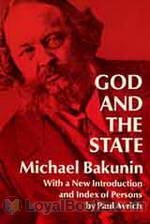 God and the State
God and the State
Bakunin’s most famous work, published in various lengths, this version is the most complete form of the work published hitherto. Originally titled “Dieu et l’état”, Bakunin intended it to be part of the second portion to a larger work named “The Knouto-Germanic Empire and the Social Revolution” (Knouto-Germanic Empire is in reference to a treaty betwixt Russia and Germany at the time), but the work was never completed. (from book introduction) | |
By: Various | |
|---|---|
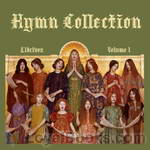 Hymn Collection
Hymn Collection
A selection of twenty hymns sung in this recording. | |
By: Unknown | |
|---|---|
 James Joyce in Context: Telemachus
James Joyce in Context: Telemachus
Collection of various works which James Joyce quotes and references to in his epic novel Ulysses, and provides them in audio form. Perfect for Joyce scholars, fans, and aficionados! | |
By: Various | |
|---|---|
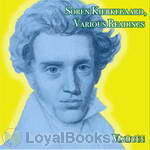 Soren Kierkegaard, Various Readings
Soren Kierkegaard, Various Readings
The writings listed here represent books about Soren Kierkegaard. A fragment of his work, On the Dedication to "That Single Individual", has made it to the public domain. Who was Soren Kierkegaard? He was a Danish philosopher and religious author; b. Copenhagen May 6, 1813; d. there Nov. 11, 1855. His father, Michael, a clothing merchant, once cursed God when he was young. This one incident caused him so much distress that it affected him with a deep melancholy, which he transferred to poor Soren... | |
By: Unknown | |
|---|---|
 The First Book of Adam and Eve
The First Book of Adam and Eve
The Conflict of Adam and Eve with Satan is a Christian pseudepigraphical work found in Ge’ez, translated from an Arabic original and thought to date from the 5th or 6th century AD. It was first translated from the Ethiopic version into German by August Dillmann. It was first translated into English by S. C. Malan from the German of Ernest Trumpp. The first half of Malan’s translation is included as the “First Book of Adam and Eve” and the “Second Book of Adam and Eve” in The Lost Books of the Bible and the Forgotten Books of Eden... | |
By: Various | |
|---|---|
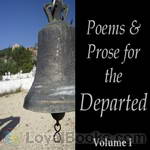 Poems and Prose for the Departed
Poems and Prose for the Departed
This is a collection of short poems and readings, both religious and secular, on death and bereavement. | |
By: The Venerable Bede (673-735) | |
|---|---|
 Ecclesiastical History of England
Ecclesiastical History of England
Bede's Ecclesiastical History of England is a work in Latin by Bede on the history of the Christian Churches in England, and of England generally; its main focus is on the conflict between Roman and Celtic Christianity. It is considered to be one of the most important original references on Anglo-Saxon history. It is believed to have been completed in 731, when Bede was approximately 59 years old. Divided into five books, it covers the history of England, ecclesiastical and political, from the time of Julius Caesar to the date of its completion (731)... | |
By: Unknown | |
|---|---|
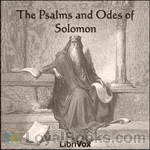 The Psalms and Odes of Solomon
The Psalms and Odes of Solomon
One of the Pseudepigrapha, the Psalms of Solomon is a group of eighteen psalms (religious songs or poems) that are not part of any scriptural canon (they are, however, found in copies of the Peshitta). The Psalms of Solomon were referenced in Early Christian writings, but lost to modern scholars until a Greek manuscript was rediscovered in the 17th century. Politically, the Psalms of Solomon are anti-Maccabee, and some psalms in the collection show a clear awareness of the Roman conquest of Jerusalem under Pompey in 63 BCE, metaphorically treating him as a dragon who had been sent by God to punish the Maccabees... | |
 The Epistle of Polycarp to the Philippians
The Epistle of Polycarp to the Philippians
Polycarp’s Letter to the Philippians (often simply called To the Philippians) composed around 110 to 140 AD [1] is described by Irenaeus as follows: There is also a forceful epistle written by Polycarp to the Philippians, from which those who wish to do so, and are anxious about their salvation, can learn the character of his faith, and the preaching of the truth. (J. Stevenson, A new Eusebius [London: SPCK, 1965] p. 120) This is one quote from the epistle: “Stand fast, therefore, in this conduct... | |
By: David Friedrich Strauss (1808-1874) | |
|---|---|
 The Life of Jesus Critically Examined
The Life of Jesus Critically Examined
Strauss was an early pioneer in the ongoing 'Quest of the Historical Jesus' held amongst New Testament scholars, and his Life of Jesus is one of the few landmarks in the field. The first edition of Strauss' book was published in Germany in 1835 when he was only 27 years old, and which by 1840 had gone through four editions. He focused his attention on battling two theological fronts which were current at the time - the traditional Orthodox who believed the miracles in the Gospels were to be taken as literal, yet supernatural, history; and the Rationalists, who believed that the Gospel miracles were all true but could be explained by natural and purely physical causes... | |
By: Unknown | |
|---|---|
 The Romance of Missionary Heroism
The Romance of Missionary Heroism
The title page gives this book the subtitle, “True stories of the intrepid bravery and stirring adventures of missionaries with uncivilized man, wild beasts, and the forces of nature in all parts of the world.” The thrilling accounts in this collection include stories of Jacob Chamberlain’s medical ministry in India, the dangers faced by Alexander Mackay in Uganda, James Chalmers’ work among the headhunters of New Guinea, John Paton’s mission to the South Sea cannibals, and the Hawaiian queen Kapiolani’s challenge to the gods of the volcano... | |
By: Max Heindel (1865-1918) | |
|---|---|
 The Rosicrucian Mysteries
The Rosicrucian Mysteries
A primer for those interested in the basic philosophy, beliefs & secrets of the Rosicrucians. | |
By: Andrew Murray (1828-1917) | |
|---|---|
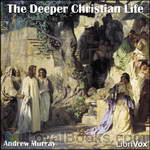 The Deeper Christian Life
The Deeper Christian Life
If you were put on trial for being a Christian, would you be convicted? Christians have asked themselves this question, or ones like it, for millennia. In his book, The Deeper Christian Life, Andrew Murray helps us come to grips with those nagging insecurities in our Christian walk. A shallow relationship with God leads us down a road of doubt and insecurities. Can I be forgiven? How can I forgive? Murray tells us that we can go deeper in our relationship with God, and with that deeper relationship comes growing confidence and joy in the gospel. That joy springs from the knowledge of God's grace in forgiving us, and enables us to extend that grace to others in our lives. | |
By: Herbert J. Hall (1870-1923) | |
|---|---|
 The Untroubled Mind
The Untroubled Mind
A very wise physician has said that “every illness has two parts—what it is, and what the patient thinks about it.” What the patient thinks about it is often more important and more troublesome than the real disease. What the patient thinks of life, what life means to him is also of great importance and may be the bar that shuts out all real health and happiness. The following pages are devoted to certain ideals of life which I would like to give to my patients, the long-time patients who have especially fallen to my lot. | |
By: Johnannes Jorgensen (1866-1956) | |
|---|---|
 Saint Francis of Assisi: A Biography
Saint Francis of Assisi: A Biography
Born to a prosperous cloth merchant of Assisi, Francis (1182-1226) lived the typically high-spirited life of a wealthy young man of his day, which included fighting as a soldier. In 1205, while away at war, he experienced a vision that beckoned him return to Assisi, where he soon lost his taste for the worldly life and began to live a life of evangelical poverty in imitation of Jesus Christ. He embarked upon a pilgrimage to Rome, where he begged for alms alongside the poor at St. Peter's Basilica... | |
By: St. Benedict of Nursia (ca. 480-547) | |
|---|---|
 The Rule of St. Benedict
The Rule of St. Benedict
The Rule of Saint Benedict (Regula Benedicti) is a book of precepts written by St. Benedict of Nursia for monks living communally under the authority of an abbot. Since about the 7th century it has also been adopted by communities of women. During the 1500 years of its existence, it has become the leading guide in Western Christianity for monastic living in community. The spirit of St Benedict's Rule is summed up in the motto of the Benedictine Confederation: pax ("peace") and the traditional ora et labora ("pray and work").(Introduction from Wikipedia) | |
By: J. C. Ryle (1816-1900) | |
|---|---|
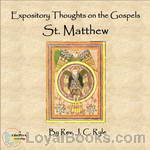 Expository Thoughts on the Gospels - St. Matthew
Expository Thoughts on the Gospels - St. Matthew
“Expository Thoughts” divides the Gospels into sections of about twelve verses each, from which J. C. Ryle selects two or three prominent points to dwell on and bring to the reader’s attention. In Ryle’s day, there were many detailed commentaries and expositions on scripture. In writing these “Expository Thoughts”, Ryle aimed to offer a resource to the laity for use in family prayers, as an aid to those who visit the sick and desire a proper book to read on such occasions, and for private devotions for those whose callings and engagements make it impossible for them to read large commentaries... | |
By: Anonymous | |
|---|---|
 The Cloud of Unknowing
The Cloud of Unknowing
The Cloud of Unknowing (Middle English: The Cloude of Unknowyng) is an anonymous work of Christian mysticism written in Middle English in the latter half of the 14th century. The text is a spiritual guide on contemplative prayer in the late Middle Ages. The book counsels a young student to seek God, not through knowledge and intellection (faculty of the human mind), but through intense contemplation, motivated by love, and stripped of all thought. This is brought about by putting all thoughts and desires under a "cloud of forgetting", and thereby piercing God's cloud of unknowing with a "dart of longing love" from the heart... | |
By: Jewish Publication Society of America (1917) | |
|---|---|
 Genesis (JPSA)
Genesis (JPSA)
The first book of the Pentateuch - Genesis. Presented according to weekly parshah.Praised are You, Adonai, Our G-d, ruler of the Universe, who has made us holy with commandments and commanded us to engage in the study of Torah. | |
By: Thomas Whittaker (1856-1935) | |
|---|---|
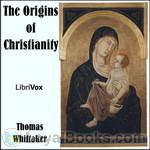 The Origins of Christianity
The Origins of Christianity
The full title of this book is The Origins of Christianity with an Outline of Van Manen’s Analysis of The Pauline Literature. Willem Christiaan van Manen (1842-1905) was a Dutch theologian. The vast majority of van Manen’s radical criticism of the New Testament and Christian origins has never been translated into English.In this book, Thomas Whittaker outlines the arguments of van Manen for an English-speaking audience. Van Manen’s work is not now generally known, but his views obtained notoriety by the articles and books that he wrote, in which he maintained that none of the Epistles that bear the Apostle Paul’s name were in fact written by him... | |
By: Louis Laravoire Morrow (1892-1987) | |
|---|---|
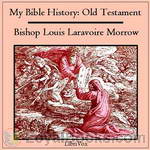 My Bible History: Old Testament
My Bible History: Old Testament
A short, simple Old Testament Bible History for children, but which can also be enjoyed by adults alike. Starting with Creation, the sections cover Adam and Eve, Abraham, Moses, etc. up to the promise of a Redeemer. The same format continues in the volume that follows - My Bible History: New Testament - by the same author. | |
By: Carlo Giuseppe Quadrupani (1740-1807) | |
|---|---|
 Light and Peace: Instructions for Devout Souls to Dispel Their Doubts and Allay Their Fears
Light and Peace: Instructions for Devout Souls to Dispel Their Doubts and Allay Their Fears
Padre Quadrupani was an Italian priest and member of the Clerics Regular of St. Paul, also known as the Barnabites, from their association with St. Barnabas Catholic Church in Milan, Italy. Quadrupani's spirituality is based on that of the illustrious Doctor of the Church, St. Francis de Sales (1567-1622). Like St. Francis, the Padre offers spiritual advice that is practical and balanced. Perhaps it is owing to this that Quadrupani's treatise has been so well received by Catholic laypersons and has been recommended by numerous bishops over the years... | |
By: Charles H. Spurgeon (1834-1892) | |
|---|---|
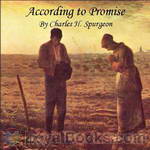 According to Promise, or The Lord’s Method of Dealing with His Chosen People
According to Promise, or The Lord’s Method of Dealing with His Chosen People
Charles Haddon (C.H.) Spurgeon (19 June 1834 – 31 January 1892) was a British Particular Baptist preacher and is still known today as the "Prince of Preachers". He was a strong figure in the Reformed Baptist tradition, defending the Church in agreement with the 1689 London Baptist Confession of Faith understanding, and opposing the liberal and pragmatic theological tendencies in the Church of his day. In his lifetime, Spurgeon preached to around 10 million people, often up to ten times each week at different places... | |
By: Louis Laravoire Morrow (1892-1987) | |
|---|---|
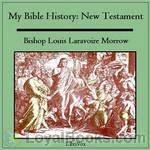 My Bible History: New Testament
My Bible History: New Testament
A short, simple New Testament Bible History for children, but which can also be enjoyed by adults alike. Starting with St. John the Baptist, and running through the beginning years of the Church, the sections cover Our Lord's birth, public life, miracles, death, resurrection and more. This is the companion volume to My Bible History: New Testament - by the same author. | |
By: Alban Butler (1711-1773) | |
|---|---|
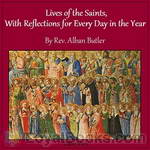 Lives of the Saints, With Reflections for Every Day in the Year
Lives of the Saints, With Reflections for Every Day in the Year
Compiled from the much larger 12 book set of "Butler's Lives of the Saints", this volume contains short biographies of the Saints, for each day of the year, followed by a reflection for each entry. | |
By: Winfrid Herbst | |
|---|---|
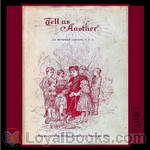 Tell Us Another! Stories That Never Grow Old
Tell Us Another! Stories That Never Grow Old
A collection of 65 little stories for the Catholic child (and adult), designed to captivatingly teach the truths and morals of the faith. This is the companion volume to "Just Stories" by the same author. | |
By: Saint Francis de Sales (1567-1622) | |
|---|---|
 Of the Love of God
Of the Love of God
Francis de Sales (1567-1622), Bishop of Geneva from 1602, was a renowned spiritual director who produced two classic guidebooks for earthly wayfarers on their spiritual journey to God: Introduction a la vie devote (Introduction to the Devout Life, 1609) and Traite' de l'amour de Dieu (Treatise on the Love of God, or Of the Love of God, 1616). In the Introduction to the Devout Life, Francis shows how anyone, whatever his or her calling or station in life, can strive for and achieve a life a piety and devotion to God... | |
By: St. John Chrysostom (349-407) | |
|---|---|
 Commentary on Galatians
Commentary on Galatians
St. Chrysostom’s Commentary on the Epistle to the Galatians is continuous, according to chapter and verse, instead of being arranged in Homilies, with a moral or practical application at their close, as in his exposition of other Epistles. It was written in Antioch, as Montfaucon infers from a reference which the Author, makes upon Chap. i., ver. 16 to other of his writings, which certainly were written about the same time in that city. (Introduction from the preface by John Henry Newman) | |
By: Hermann Gunkel | |
|---|---|
 The Legends of Genesis
The Legends of Genesis
The Legends of Genesis is the English translation of the introduction to Gunkel’s massive commentary, Genesis. Gunkel uses form critical analysis on the text of Genesis to determine the various genres of the biblical legends and their significance to the authors. Gunkel also uses form criticism to uncover buried clues as to the constituent sources of the text. Gunkel offers his hypothesis to explain how the various sources came to be combined and redacted, and how the text later came to be attributed to Moses. | |
By: Unknown | |
|---|---|
 Three Ecumenical Creeds
Three Ecumenical Creeds
MANUAL OF SURGERY, OXFORD MEDICAL PUBLICATIONSBY ALEXIS THOMSON, F.R.C.S.Ed.PREFACE TO SIXTH EDITION Much has happened since this Manual was last revised, and many surgical lessons have been learned in the hard school of war. Some may yet have to be unlearned, and others have but little bearing on the problems presented to the civilian surgeon. Save in its broadest principles, the surgery of warfare is a thing apart from the general surgery of civil life, and the exhaustive literature now available on every aspect of it makes it unnecessary that it should receive detailed consideration in a manual for students... | |
By: Ludwig Feuerbach (1804-1872) | |
|---|---|
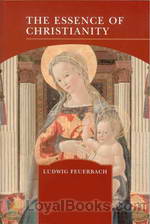 The Essence of Christianity
The Essence of Christianity
Taking issue with Hegel’s sense that God, as Logos, is somehow central to all that is, Feuerbach explores his own notion that Christianity, as religion, grew quite naturally from ordinary human observation. Only upon deeper, systematic reflection did people postulate a divine source–God. Religious teaching which loses sight of its own essential rootedness in human experience runs the risk becoming overly abstract, disconnected even, from realities which shape humanity and which impart meaning and dignity to life... | |
By: Martin Luther (1483-1546) | |
|---|---|
 The Bondage of the Will
The Bondage of the Will
On the Bondage of the Will (Latin: 'De Servo Arbitrio', literally, "On Un-free Will", or "Concerning Bound Choice"), by Martin Luther, was published in December 1525. It was his reply to Desiderius Erasmus's De libero arbitrio diatribe sive collatio or On Free Will, which had appeared in September 1524 as Erasmus's first public attack on Luther, after being wary about the methods of the reformer for many years. At issue was whether human beings, after the Fall of Man, are free to choose good or evil. The debate between Luther and Erasmus is one of the earliest of the Reformation over the issue of free will and predestination. | |